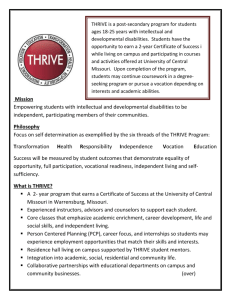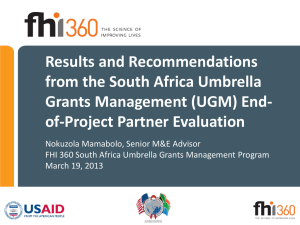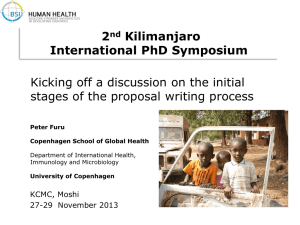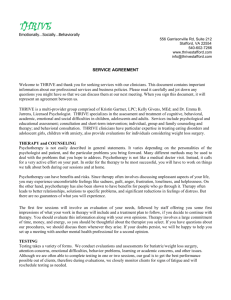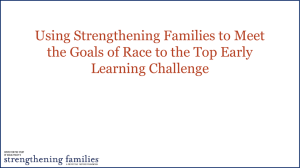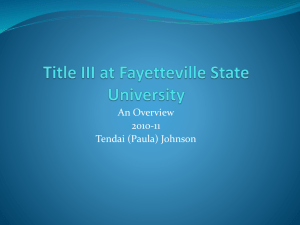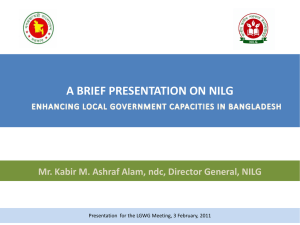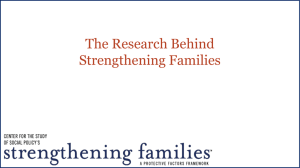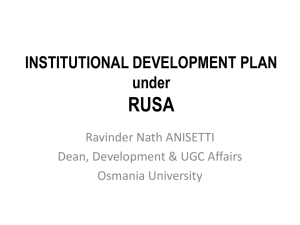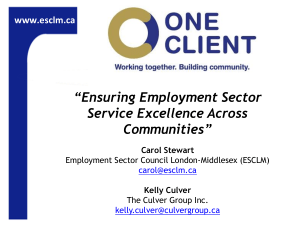THRiVE
advertisement
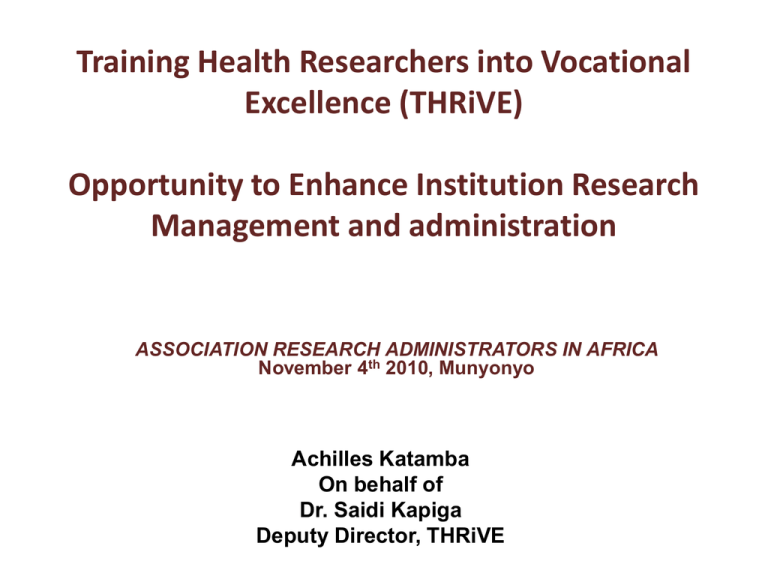
Training Health Researchers into Vocational Excellence (THRiVE) Opportunity to Enhance Institution Research Management and administration ASSOCIATION RESEARCH ADMINISTRATORS IN AFRICA November 4th 2010, Munyonyo Achilles Katamba On behalf of Dr. Saidi Kapiga Deputy Director, THRiVE STRUCTURE OF THE PRESENTATION Brief description of THRiVE Strengthening partnerships & networking Institutional strengthening How do we enhance Research Management and Administration THRIVE: PARTICIPATING INSTITUTIONS Country Uganda Tanzania Rwanda Institutions Makerere Univ. KCMC NUR Kenya LSHTM Gulu Univ. UVRI UK Cambridge Univ. NIMR ICIPE Goal Empower East African academic institutions for effective participation in the march of science. FOCUS AND SCOPE OF THRIVE Objectives Develop and sustain a consortium functioning as a strong network Contribute to empowering institutions to build a critical mass of well trained research scientists capable of winning competitive national and international grants Augment the development of a conducive institutional environment for research and research training Support systems for improved governance/management of research activities THRiVE GOVERNANCE STRUCTURE Programme Steering Committee Advisory Board Executive Directorate Institutional Implementation Committees: Cambridge, LSHTM, Mak, KCMC, Gulu, NUR, NIMR, UVRI, ICIPE Education and Small Grants Committee PhD/Post Doctoral Training Committee Finance Committee STRENGTHENING PARTNERSHIPS AND NETWORKING WITHIN THRiVE Public understanding of science – Cambridge, Makerere, ICIPE DTM&H (Makerere, KCMC, UVRI, LSHTM, Univ of Washington & Johns Hopkins) Medical education Partnership: Makerere, Gulu, Mbarara, UVRI/MRC,... KCMC but not NUR Carried out needs assessment for short courses e.g. Scientific Writing workshops Enhanced south to south collaboration Website facilitating communication among partners STRENGTHENING EXTERNAL PARTNERSHIPS AND NETWORKING With other Networks/Institutions outside THRiVE Association of Research Administrators (ARAA): 3-5 Nov 2010 Kampala, Uganda, Theme: Institutionalizing Research Administration in Africa Initiative for Strengthening Research Capacity in Africa (ISHReCA ) MUII (Makerere-UVRI Infection and Immunity) Project Public understanding of science - British Institute of EA Other WT Consortia Emerging NIH-MEPI network HHS AGENCIES PARTNER WITH PEPFAR TO TRANSFORM AFRICAN MEDICAL EDUCATION A dozen countries to benefit from $130 million investment over 5 years to strengthen medical training and research capacity The U.S Department of HHS is partnering with PEPFAR with a plan to transform African medical education & dramatically increase the number of health care workers. MEPI grants are being awarded directly to African institutions working in partnership with U.S. medical schools & universities. “We must dramatically transform African medical education to increase the number of qualified care providers available & develop the scientific expertise needed for research & innovation,” Eric Goosby STRENGTHENING INSTITUTIONAL SYSTEMS Upgrading laboratory infrastructure Support for upgrade and enhance access to IT Staff development through Masters/PhDs/Postdocs Cross appointments: between Research Institutes and Universities Strengthening research management systems Strengthening systems for ethical review & oversight NIMR (Moshi) collaborating with KCMC to develop plans for strengthening Masters training at KCMC THE THRiVE APPROACH TO BUILDING INSTITUTIONAL SYSTEMS Requires linkage and collaboration with central institutional administration Avoiding unnecessary duplication, parallel structures and competition with other partners Institutional Implementation Committees to meet regularly and chart out a path for institutional strengthening Need for long term commitment and focus Good examples needed How do we enhance Research Management and Administration In order to enhance capacity for research management and administration three is need to develop a shared understanding of what research management and administration entails and challenges that research administrators and managers experience, thus deterring achievement of maximum performance in their day to day work How do we enhance Research Management and Administration The ARAA meeting offers an opportunity to explore and document opportunities and challenges that affect research management and administration and more importantly contribute to the long and drawn-out process of enhancing capacity and research outputs How to enhance Research Management and Administration Some of the areas of consideration should include developing and implementation of governance tools like Research strategic and operational plans Resource mobilization plan specifically targeted to improve research management and administration Administrative and financial procedures manuals How do we enhance Research Management and Administration Guidelines for accreditation and evaluation of research units Information and knowledge management including proper documentation and record keeping Research policies including those of intellectual property Codes of ethics and regulatory processes Human resource support and career development Conclusion There is need to enhance professionalization and institutionalization of research governance and management as a mean of enhancing institutional and national innovation systems to meet the challenges posed by changing contexts and new requirements for research THE FUTURE: AIM HIGH AND FAR 17
